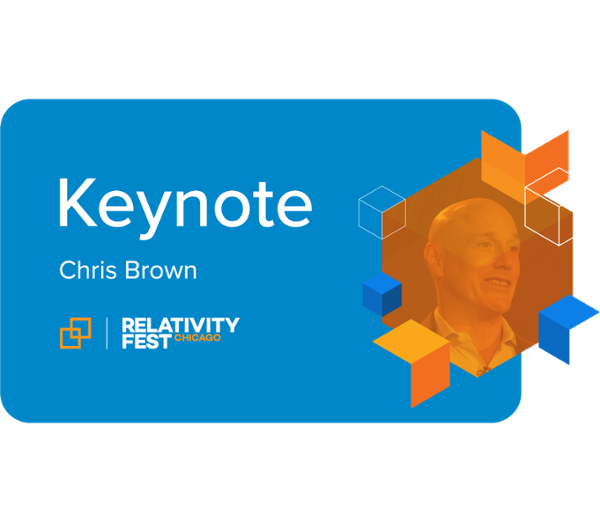For the last 24 years, Relativity has been building an extensible, AI-powered platform to empower our community to tackle all kinds of legal data intelligence use cases.
Today, we support more than 300,000 active workspaces in Relativity. The matters managed in our platform span across different LDI use cases and project sizes, from litigation to regulatory requests to internal investigations to data breach response to DSARs, and more. Each project (or workspace) can represent a range of a few thousand to millions of documents. Already, hundreds of teams are using generative AI, through RelativityOne, to get all of this work done fundamentally better than ever before.
This didn’t happen in a vacuum.
As our CEO Phil Saunders noted in this morning’s keynote at Relativity Fest Chicago, our community and platform haven’t just evolved, they’ve transformed. Many of you have been on this journey with us all along, and you continue to partner with us as we embrace the next chapter of our industry—joining us as we listen, iterate, and work to provide new capabilities year after year for you and your teams.
Thank you. I’m transformed and inspired by what you all are able to accomplish with our platform every day as you organize data, discover the truth, and act on it.
And, as I shared on stage at Fest this year, we’re just getting started. We covered a range of exciting updates in today’s keynote, and they’re worth a deep dive here on The Relativity Blog. (Hint: agentic AI is, indeed, in the aiR.)
Watch a full recording of the Relativity Fest Chicago 2025 Keynote here.
Legal AI: Reshaping Workflows, Accelerating Outcomes
In 2025, 43 percent of new workspaces in RelativityOne are dedicated to litigation matters, reinforcing the core use case for our community. But the breadth of projects you conduct in the platform has transformed to also include investigations, FOIA requests, data breach responses, third-party subpoenas, and more.
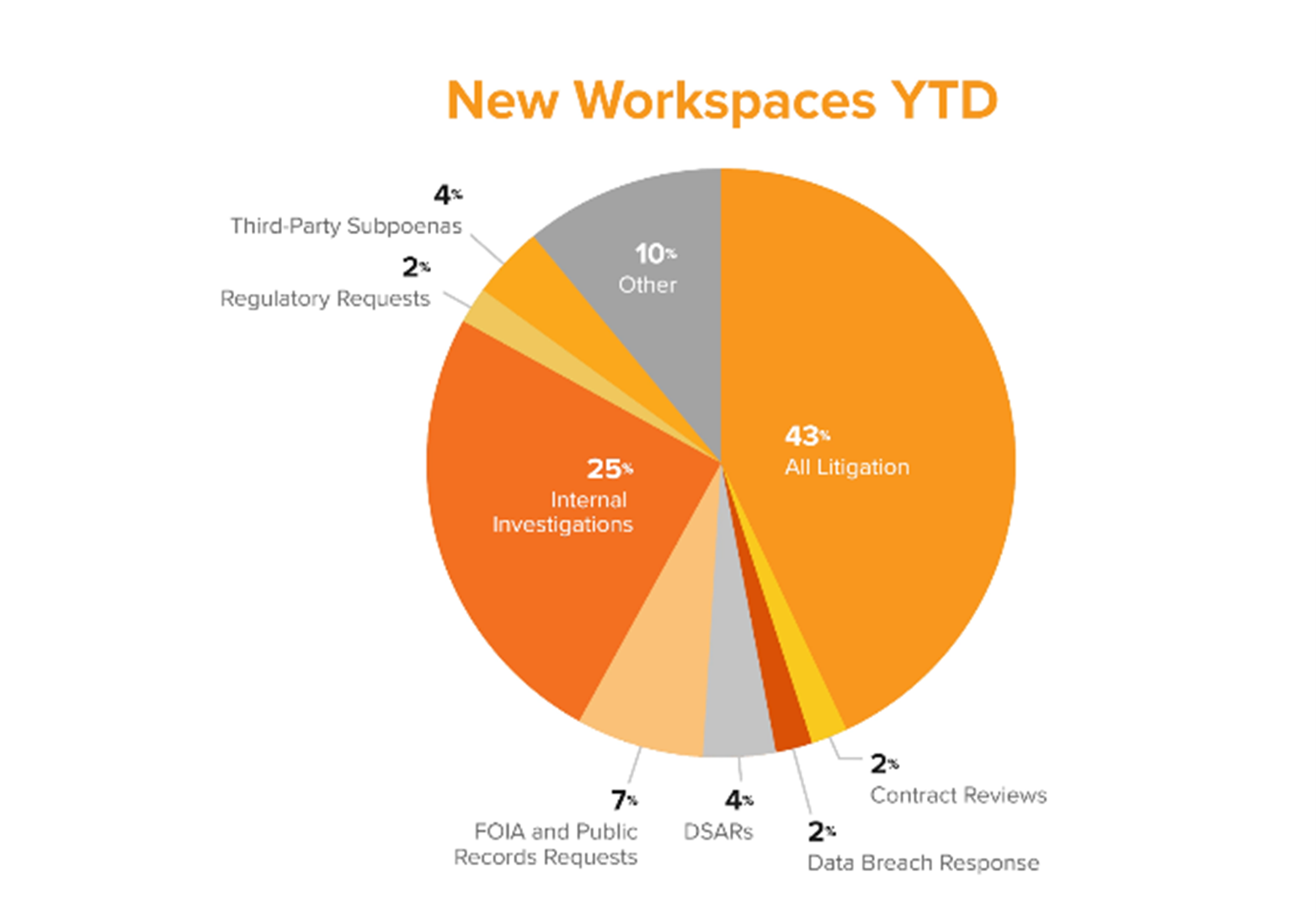
It’s a pretty incredible landscape of legal data challenges.
Do you ever wonder how we—not just Relativity, but all of us—support such a wide and increasing range of use cases, all over the world?
A crucial step is building an ontology that is unique to your team, your matters, and your practice. These ontologies form a structured map of concepts and relationships that define how information connects and what it means. This knowledge then becomes the semantic layer that empowers human experts, artificial intelligence, and connected workflows to deliver incredible results.
Our AI layer in RelativityOne goes beyond simple LLM calls. We’ve built an ensemble of specialized models for many unique functions—for example, relevance analysis, privilege detection, and fact extraction—that sit atop our AI foundational infrastructure and support our growing suite of generative AI applications from aiR for Review to Data Breach Response. All of this is enabled by the scale and security of the cloud, and is built to help you conduct every project with game-changing speed, accuracy, and trust.
More Robust Workflows for Every LDI Project
We want to help you manage all your legal data intelligence projects from start to finish within one single, secure, and seamless experience—no matter what use case you’re looking at, deadline you are up against, or data sources you’re reviewing.
RelativityOne is the engine powering all these projects. In parallel to the AI innovation we are delivering, we've continued to invest in that engine and the essential capabilities your team leans on every day, to ensure you can tackle any legal data challenge.
Enhancements to Collect in RelativityOne
For example, Collect in RelativityOne now supports collections from key cloud sources and conversational AI platforms, including Microsoft and Google suites, Slack, ChatGPT, Copilot, and Gemini. Human-to-AI chats are automatically converted to Relativity Short Message Format (RSMF) for a review experience unlike any other (and we’ve got a patent pending to prove that).
Our Purview Sync integration, coming soon, will help evidence flow directly from Microsoft products into RelativityOne, so you can be ready to start discovering insights with aiR instantly.
Even bigger? We’ve built a brand-new Collect API—limited availability coming by the end of 2025—that will automate setup and execution of collection jobs and open the door for our partners and community of developers to build new connectors directly to RelativityOne.
This means faster collections today, plus a stronger ecosystem of connectors for tomorrow’s data sources and evolving data challenges.
More Ways to Get More from Your Data, Faster
Beyond streamlining data collection, improvements in Migrate and Processing simplified how teams move and manage all 8.7 petabytes of the data processed in RelativityOne within the last 12 months alone.
Once your data is in RelativityOne, quickly making good use of it is key. This year, we introduced AV Transcription to help turn hours of audio/visual evidence—voicemails, Zoom recordings, surveillance footage—into reviewable, digestible data with incredible speed and precision.
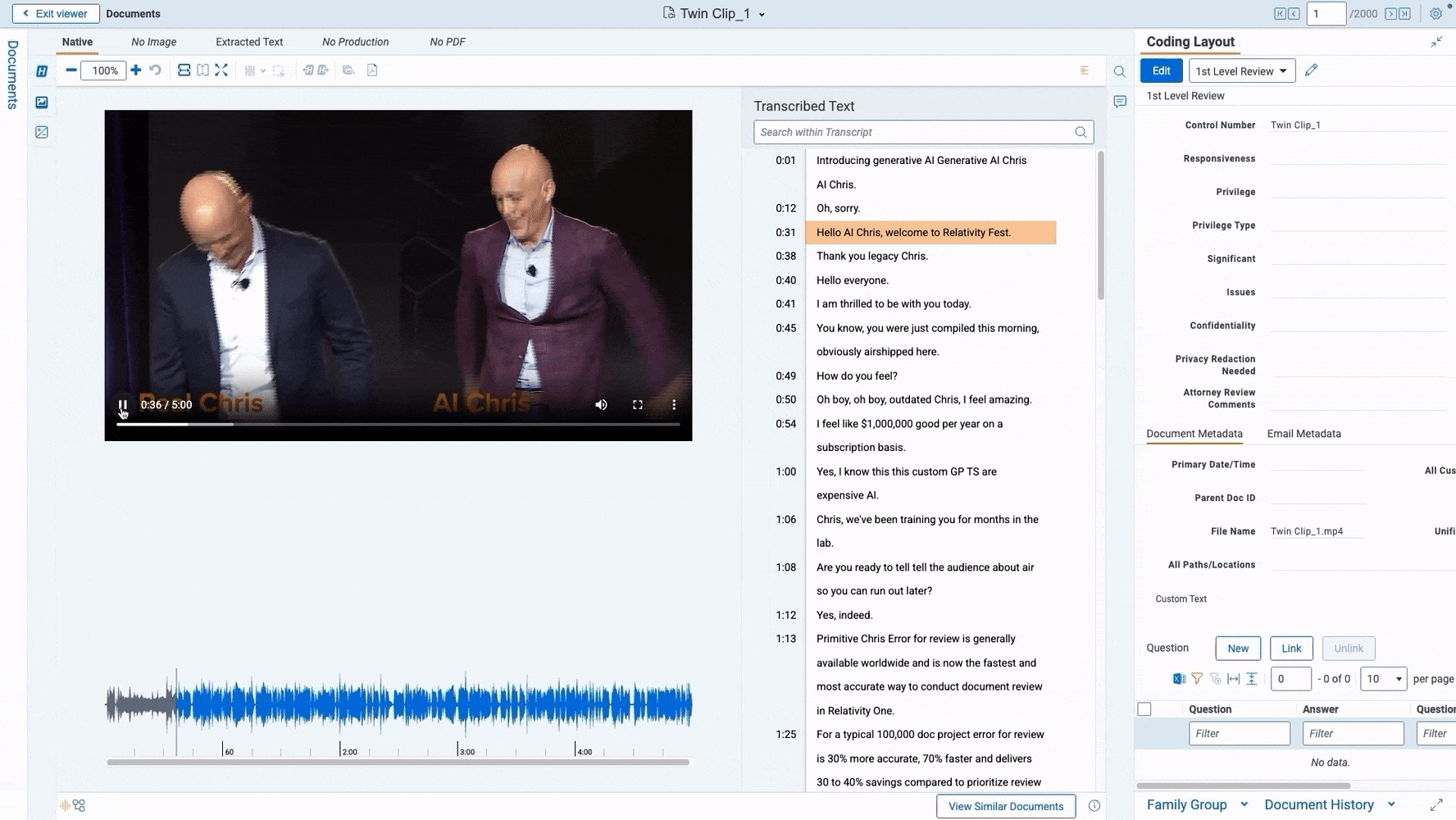
The interface mirrors how you already review documents—but now, you have time-synced transcripts layered on top of audio and video. It’s intuitive for first-time users and built to handle high-volume, high-stakes reviews with ease.
We also updated feature permissions to turn what used to be a tedious, manual process into a simple, more secure, and scalable experience to save RelativityOne users thousands of clicks each month, freeing up essential time for more substantive work with your data.
Enabling More Legal Data Intelligence Projects
Getting more value out of your data also means getting more functionality out of RelativityOne to tackle a range of legal data intelligence demands.
We've delivered fit-for-purpose AI solutions for two legal data intelligence use cases already: contract reviews and data breach responses.
Relativity Contracts is now powered by generative AI, featuring new models and output validation workflows to help you efficiently and accurately transform thousands of signed agreements into tables with fielded data. It’ll help you surface insights faster, enabling simpler, more straightforward interrogation and understanding in a single place.
Relativity Data Breach Response has helped teams review more than 30 terabytes of data involved in cyber matters in the last six months. Here, too, generative AI changes the game: it's delivered time savings of 50-70 percent for our users by accelerating personal information extraction, linking entities, and more.
What’s New in aiR for Review and aiR for Privilege
Customers have used aiR to make over 100 million decisions on their documents over the last 20 months. Whether it is gathering early case insights, conducting investigations, or accelerating first-pass review for production, aiR is actively transforming the most resource-intensive workflows in legal data intelligence to enable you to act on your data faster and with more confidence.
First, there's our new Draft with AI feature, which lawyers can use to kickstart their aiR projects with immediate case context. Based on your feedback, we developed this feature to reduce friction around initial prompt iteration and ensure getting started with aiR for Review is seamless.
Give aiR for Review the materials your case team already has on hand—complaints, requests for production, internal memos, review protocols—and watch it automatically generate a first draft of your prompt criteria. You can learn all about it here.
Next, new analysis types—currently in use by a handful of Advance Access users and rolling out for everyone soon—will better help you protect confidential business and personal information within your aiR for Review projects.
Sensitive business information analysis in aiR for Review can help you quickly locate confidential content—like financial information, client details, IP and trade secrets, and source code—and classify applicable documents as confidential, attorney-eyes-only, or outside-counsel-only to ensure they’re appropriately safeguarded right from the start.
Last, personal information analysis will help you find and shelter social security numbers, bank account information, phone numbers, and more, with greater accuracy than simple searches or RegEx sweeps.
As part of our approach to building AI responsibly, establishing confidence in generative AI’s results is a requirement for using these tools to their fullest potential and defending that use with colleagues, opposing counsel, and jurists. These aiR outputs or determinations come with rationales, considerations, and citations to offer transparency into the AI’s decisions, accelerate necessary QC work, and dismantle any perceptions of a “black box.” Beyond this hands-on confidence, statistical validation empowers you to verify gen AI’s accuracy in document review using the same metrics that once helped teams earn judicial approval for their technology-assisted review workflows. Review Center in RelativityOne will now automatically calculate these statistics for you during an aiR project, further simplifying the calculation process.
Not just at the end of an aiR project, either. You can calculate metrics like precision, recall, and elusion rate right from the start, which means you can fine-tune your prompt criteria against aiR’s outcomes to home in on the right strategy before running your project on thousands of documents.
If you want to learn more, take a deep dive into statistical validation for generative AI, why it matters, and how to do it for aiR, read our recent white paper.
Finally, aiR for Privilege’s noteworthy UI upgrades and forthcoming new user experience will align it directly with aiR for Review, to bring the most important, privilege-specific contextual information directly to your fingertips all at once.
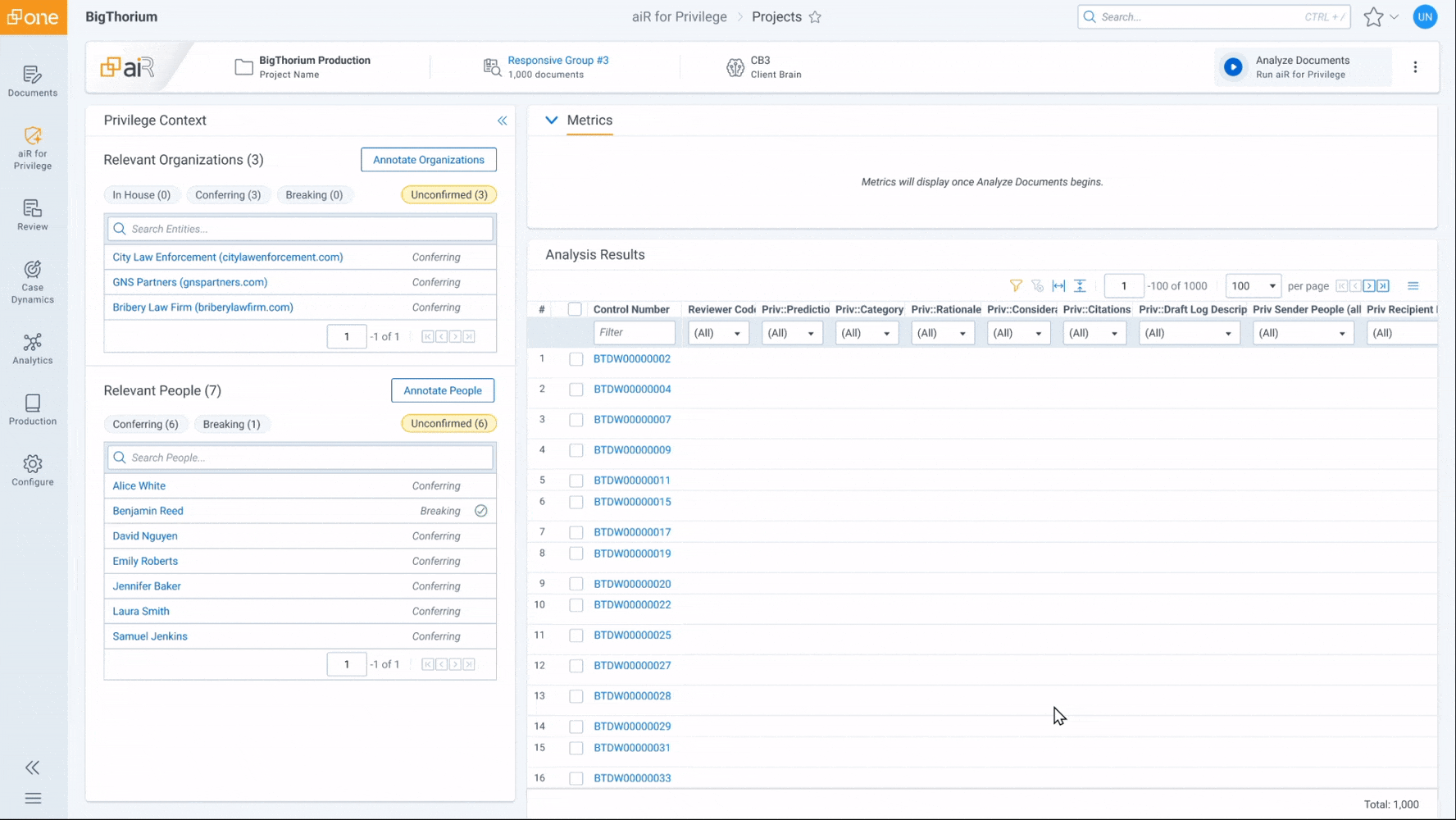
As Phil announced, aiR for Review and aiR for Privilege are now standard in our RelativityOne offering. If you haven’t yet discovered how aiR accelerates innovation in legal AI workflows, try it for yourself! There’s never been a better time to get started.
Introducing aiR Assist
Natural language interfaces are reshaping and transforming how we all interact with technology. Where we once had to translate our thoughts into technical queries before interrogating a data platform, we can now simply engage in an investigative conversation with an AI model that can rapidly dig into the data for us.
This week, we announced aiR Assist: a brand-new, conversational experience in RelativityOne, which you can use throughout the lifecycle of a case to efficiently understand actors, roles, relationships, events, and communications within your data—and ultimately uncover key facts to develop your case strategy.
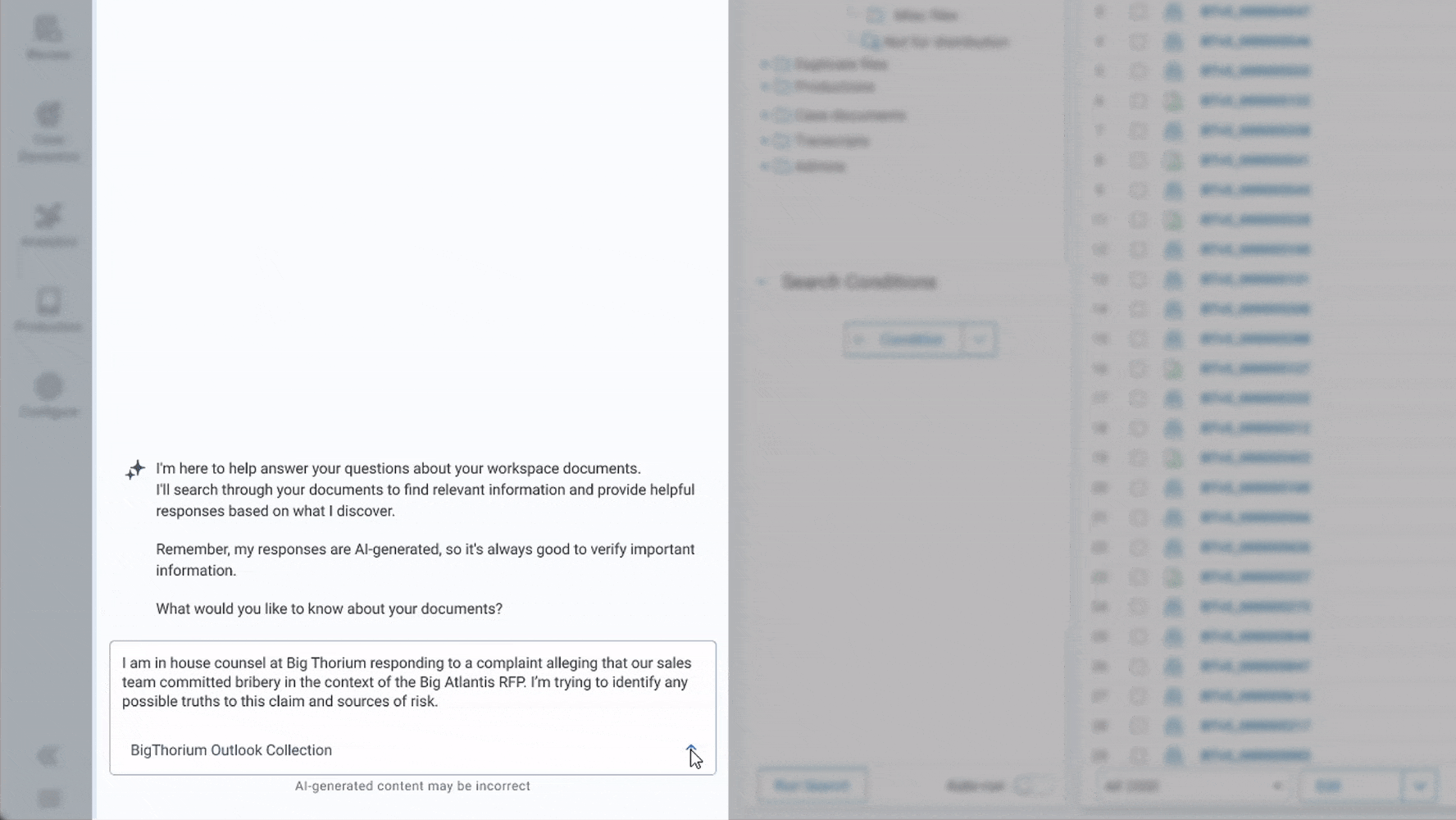
You’ll be able to access aiR Assist throughout your aiR for Case Strategy projects. Use it to target different tranches of documents and ask deep questions without interrupting your focus; it’ll help you locate key documents, spot signals, and get transparent answers to your questions, supported by citations that you can dig into for verification.
Over time, it uses your conversations to build context for answering each new question. True to our AI Principles, if aiR Assist doesn’t understand your intent or know how to answer, it’ll ask you for more clarity and control before moving forward.
The power of aiR Assist in case development is just the beginning. Soon, it will expand to recently ingested documents and data to drive the early case intelligence you need to uncover insights faster and start your projects with more confidence. aiR Assist won’t just answer questions—it will be able to act, in ways like kicking off a deep research agent to synthesize and compile a detailed report of where your case sits and where to probe next.
Agentic AI in RelativityOne
Truly transformative AI doesn’t just make conversation—it takes action. That’s where agentic workflows come into focus, and how aiR impacts your projects and your team.
As we’ve shared previously, agentic AI encompasses systems that can perceive, think, and act. The agentic workflows you’ll find in aiR—in the Draft with AI feature, aiR Assist, and aiR for Case Strategy, to name a few—make your journey from issue to insight faster and more accurate than ever before.
We couldn’t be more excited to build that reality for you.
Here’s a preview of where we’re headed.
A System of Action for Legal Data Intelligence
Data volumes and complexities, cost constraints, changing business forces, and evolving risk and regulatory landscapes are putting pressure on legal teams to simplify and consolidate work. It makes sense to have a single system of record to support all your LDI needs
As Phil shared, being a system of record isn’t enough. You need a system of action where practitioners execute tasks, make decisions, and orchestrate workflows across multiple systems. A platform for conducting all your legal data intelligence tasks, securing the most sensitive data you handle each day, and enabling greater collaboration between humans as well as between humans and AI—so that you can act on your matters confidently and with intelligence.
It sounds simple. But in practice, it takes a lot of effort, thoughtful innovation, and the trusted partners in our community to help us evolve and transform the way we work together.
Graphics for this article were created by Kael Rose.



